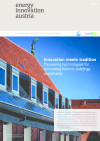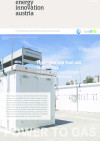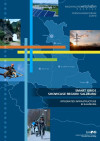Suchergebnisse für "Factsheet: Energietechnologien gestalten, die für alle sinnvoll und nutzbar sind"
Tagung: 5. Nationale Photovoltaik-Tagung
25. Mar 2004 -
26. Mar 2004
ETH ZürichZürich, CH
Integration Solarstrom - Architektur
Innovation meets tradition

Pioneering technologies for renovating historic buildings sustainably
energy innovation austria
1/2014
Herausgeber: BMVIT und Klima- und Energiefonds
Englisch, 8 Seiten
Downloads zur Publikation
Hydrogen and fuel cell technology

in the energy and transport systems of the future
energy innovation austria
2/2015
Herausgeber: BMVIT und Klima- und Energiefonds
Englisch, 8 Seiten
Downloads zur Publikation
IEA Bioenergy Task 40 Newsletter: Halbjahresbericht Juni 2020 - Jänner 2021 (2/2021)

Halbjährlicher Newsletter des IEA Bioenergy Task 40: Bereitstellung biobasierter Wertschöpfungsketten
Herausgeber: IEA Bioenergy Task 40
Englisch, 4 Seiten
Downloads zur Publikation
Sustainable ventilation systems in multi story residential buildings in the conflict areas of hygiene and costs
The goal of this project was to develop guidelines for hygienic and cost-efficient mechanical ventilation systems in residential buildings, in which maintenance and cleaning demands are described. These guidelines are based on existing literature as well as practical experience of the property owners, finally they are based on results of hygienic measurements in existing ventilation systems conducted in this research project.
Building of Tomorrow for the construction industry
Dissemination of results of the research initiative "Building of tomorrow" for two specific target groups - master builder and installer - implementation in further vocational training concepts
win wi[e]n: block development ground floor zone: Optimization of the Viennese block renewal programm as a tool for a sustainable development of street level and open (public) spaces of urban fabric
Development of the Viennese Block Renewal Program with a special focus on the ground floor zone of historical urban fabric (on the basis of the case study Block Renewal Area Ilgplatz, Vienna): sustainable restructuring and reusing of the blocks at ground level, including courtyards and street spaces- as a comprehensive planning approach.
IEA PVPS Task 15: Builiding integrated Photovoltaic (Working period 2019 - 2023)
The IEA PVPS Task 15 promotes building-integrated photovoltaics (BIPV) by overcoming technical and non-technical barriers. Despite its potential, BIPV remains largely underutilised due to economic, legal and normative barriers, lack of knowledge transfer and business models. Task 15.2 addresses these issues through research exchange and bridging gaps between BIPV stakeholders to accelerate the implementation and market penetration of BIPV.
Energy center for the production of heat, power, substitute natural gas and liquid biofuels
The project deals with the production of synthesis gas from biological fuels and biological residues using steam blown gasification. This synthesis gas will be used for polygeneration especially for heat, power, gaseous (substitute natural gas, SNG) and/or liquid fuel production.
Pioneer region for Smart Grids in Vorarlberg: International Connection
New4Old - New energies for old buildings
The project "New4Old - New energy for old buildings - Promoting the integration of RES & RUE measures in historic buildings" aims to promote the integration of renewable energy and energy efficiency technologies into historic buildings, and to create a European-wide network of Renewable Energy Houses in the different Member States of the European Union.
Practice Guide for Sustainable Building Sanitation and Modernisation within Construction Intents

A checklist considering priority, construction progress and actors is elaborated to serve a future-oriented selection of materials, energy carriers, design and construction within building sanitation, under a deliberate consideration of the involved actors from the construction branch
Oekosan'11 - International symposium for high-quality retrofit of large-volume buildings to plus-energy-buildings
The AEE INTEC organized the international congress "ökosan'11 - high-quality retrofit of large-volume buildings to plus-energy-buildings" in September 2011. The position of Austrian companies in international cooperation was strengthened through personal contacts during the conference.
Themen
EnergyCityConcepts - Methods and concepts for the implementation of sustainable energy systems in cities
Two concrete model regions (small city Gleisdorf and urban city quarter Salzburg-Schallmoos) will be developed and tested using new methodical approaches (interdisciplinary urban and regional energy planning, modeling and simulation). Therefore, it is aimed to substantiate scenarios and concepts for the implementation of defined targets on technical, ecological and economic criteria.
GreenDeal4Real - Improving the thermal comfort in mixed-use areas through cost-effective green infrastructure
The aim of the project is to avoid overheating in summer by using innovative greening measures in the mixed residential and commercial area Aspernstraße/Lavaterstraße. The development of a guideline should facilitate the realisation of climate-sensitive projects from strategy to actual implementation and ensure a high degree of transferability to other areas.
SmartCity Baumgarten - Demonstration of an anergy network and implementation of climate-friendly solutions in existing districts
Implementation of a cross-property anergy network for the supply of heating, cooling and electricity in an existing neighbourhood. With this demonstration project, a technical-legal alternative for areas outside of district heating supply is developed, which makes it possible for neighbourhoods to join together to use renewable energies in common.
GREENsChOOLENERGY - Development and practical implementation of sustainable solutions for urban hotspots in combination with greening / PV / water
Use of the synergetic effects in the construction of photovoltaic, greening and irrigation systems at the location of HTL1 Klagenfurt Lastenstraße, to optimize the yield of experimental photovoltaic elements and at the same time reduce urban heat islands.
Indicators for urban areas – for construction, operation and mobility in climate-friendly areas
Development and coordination of indicators for energy and ecological evaluations of urban areas based on the Swiss 2000-Watt certification system. The results will be used for the development of a quality assurance system for urban areas similar to the klimaaktiv declaration for buildings and the e5 certification for communities.
Smart Grids Showcase Region: Salzburg

Integratred Infrastructure in Salzburg
Forschungsforum
2/2010
Herausgeber: BMVIT
Englisch, 6 Seiten
